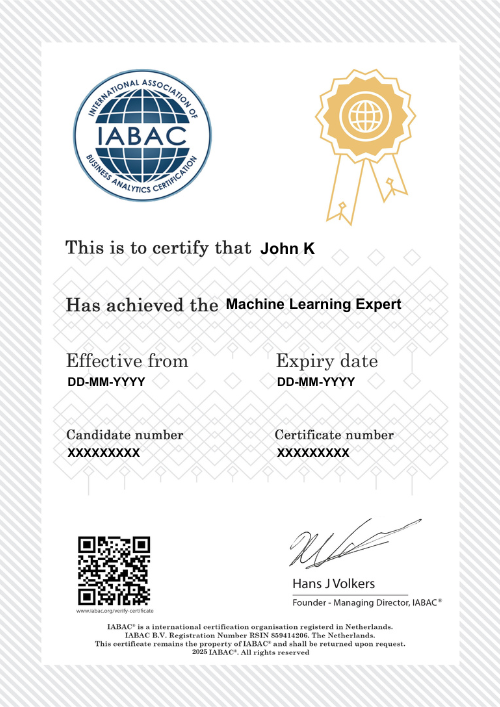Instructor Led Live Online
Self Learning + Live Mentoring
In - Person Classroom Training




The following topics are covered in "Machine Learning"
Foundation:
Machine Learning Introduction: Supervised and Unsupervised Learning
Multiple Linear Regression
Decision Tree:
Naive Bayes:
Support Vector Machines:
Association Rule:
Expert:
Neural Net:
Random Forest:
Recommendation Engine:
Dimension Reduction:
Machine Learning is a branch of artificial intelligence that focuses on developing algorithms and models that enable computers to learn from data and make predictions or decisions without being explicitly programmed.
Skills necessary for Machine Learning include proficiency in programming languages like Python or R, knowledge of statistics and mathematics, data analysis and preprocessing, understanding of algorithms and model evaluation techniques, and domain expertise.
Commonly used tools in Machine Learning include Python libraries such as scikit-learn, TensorFlow, and PyTorch for building and training models, Jupyter Notebook for interactive development, and tools like pandas and numpy for data manipulation and analysis.
There are numerous models in Machine Learning, including linear regression, decision trees, random forests, support vector machines (SVM), naive Bayes, k-nearest neighbours (KNN), neural networks, and more.
The content of a Machine Learning expert course may vary, but it typically includes topics like data preprocessing, feature selection, model training and evaluation, regression, classification, clustering, dimensionality reduction, and deep learning techniques.
Job roles associated with Machine Learning include Machine Learning Engineer, Data Scientist, Data Analyst, Research Scientist, AI Engineer, and Data Engineer.
The machine learning training cost in India ranges from INR 70,000 to 1,00,000.
Yes, there is a high demand for Machine Learning professionals across various industries due to the increasing importance of data-driven decision-making and the integration of AI technologies in businesses.
The three main types of Machine Learning are supervised learning, unsupervised learning, and reinforcement learning.
Machine Learning is commonly applied in various domains such as healthcare (diagnosis, drug discovery), finance (fraud detection, stock market prediction), marketing (customer segmentation, recommendation systems), computer vision (image recognition, object detection), natural language processing (sentiment analysis, language translation), and many more.
The purpose of utilizing machine learning is to enable computers to automatically learn from data and improve their performance or make predictions without being explicitly programmed, thereby helping in tasks like pattern recognition, prediction, decision-making, and automation.
Recurrent Neural Network (RNN) is a type of neural network architecture designed to process sequential data by using recurrent connections. It is commonly used for tasks like natural language processing, speech recognition, and time series analysis.
K-nearest neighbours (KNN) are used for classification and regression tasks, often applied in recommendation systems and pattern recognition. RNN is used for sequential data analysis, such as text generation, speech recognition, and machine translation.
K-nearest neighbours (KNN) are characterized by non-parametric and lazy learning, suitable for pattern recognition tasks. Support Vector Machines (SVM) are based on maximizing the margin between classes, and they are commonly used for classification and regression tasks in various domains.
The "10 times rule" in machine learning suggests that to have a reliable and accurate model, you should aim to have at least 10 times the number of observations (samples) compared to the number of parameters in your model. This rule helps avoid overfitting and ensures better generalization of the model.
DataMites Institute in Lucknow offers benefits such as experienced trainers, comprehensive course content covering various Machine Learning concepts, hands-on practical sessions, industry-relevant projects, and post-training support, making it a valuable choice for Machine Learning training.
The Machine Learning Training provided by DataMites in Lucknow is worth considering due to its quality curriculum, expert trainers, practical-oriented approach, and the opportunity to gain in-depth knowledge and skills in Machine Learning, enhancing career prospects in the field.
The training course spans over 5 months, providing students with a total of 400 hours of dedicated learning, including 100 hours of interactive online training.
The machine learning training fee in Lucknow is dependent on the learning mode selected. The options include INR 60,000 for Live virtual training, INR 36,000 for blended mode learning, and INR 60,000 for on-demand classroom training.
DataMites Institute in Lucknow provides a range of machine learning courses, including Machine Learning Expert Training, Machine Learning Foundation Training, Tensorflow for Machine Learning, Python for Machine Learning, and R for Machine Learning Training.
The Machine Learning Expert Course offered by DataMites in Lucknow is open to individuals who have a background in computer science, mathematics, statistics, or other related fields, making them eligible for enrollment.
DataMites in Lucknow provides Machine Learning courses with placement assistance, offering support to students in finding job opportunities in the field. The DataMites Placement Assistance Team (PAT) provides various services, such as connecting students with job opportunities, assisting with resume creation, conducting mock interviews with industry professionals, and discussing interview-related questions.
At DataMites, a comprehensive learning approach is followed, which encompasses theoretical knowledge, practical hands-on practice, case studies, project implementation, and model deployment. This approach ensures that students receive a holistic learning experience during their training at DataMites.
DataMites offers the Flexi-Pass option, allowing participants to access training sessions for a duration of 3 months. This enables them to receive extended support and guidance, ensuring that doubts are addressed and concepts can be reviewed as needed.
DataMites provides a complimentary demo class, giving participants a preview of the training program and an opportunity to understand what they can expect during the training sessions.
Upon successful completion of the Machine Learning training, participants will receive the prestigious IABAC® certification, which is globally recognized and highly respected in the industry for its credibility and validation.
DataMites provides participants with various payment options, including cash, net banking, checks, debit cards, credit cards (Visa, Mastercard, American Express), and PayPal. These options ensure convenient and flexible payment methods for participants.
DataMites in Lucknow offers Machine Learning courses through different training methods, such as live virtual training, blended learning (a mix of online and classroom training), and on-demand classroom training. This ensures learners have the flexibility to choose their preferred mode of learning based on their needs and preferences.
The salary of a machine learning engineer in India ranges from INR4,80,000 per year according to a Glassdoor report.
The DataMites Placement Assistance Team(PAT) facilitates the aspirants in taking all the necessary steps in starting their career in Data Science. Some of the services provided by PAT are: -
The DataMites Placement Assistance Team(PAT) conducts sessions on career mentoring for the aspirants with a view of helping them realize the purpose they have to serve when they step into the corporate world. The students are guided by industry experts about the various possibilities in the Data Science career, this will help the aspirants to draw a clear picture of the career options available. Also, they will be made knowledgeable about the various obstacles they are likely to face as a fresher in the field, and how they can tackle.
No, PAT does not promise a job, but it helps the aspirants to build the required potential needed in landing a career. The aspirants can capitalize on the acquired skills, in the long run, to a successful career in Data Science.









